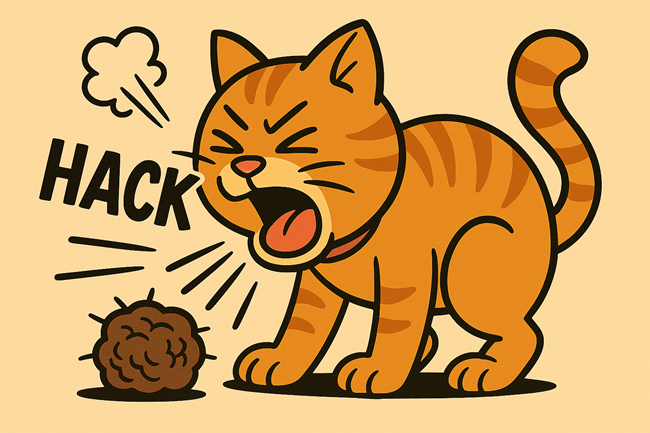
Nothing is quite so alarming as hearing the “hack-hack-hack” of a cat trying to cough up a hairball. Although hairballs may be the topics of jokes among humans, they are a source of discomfort or worse, for cats. Hairballs pose a potential danger by blocking the passage of digested food through the intestines, causing an impaction. Hairballs are formed when a cat grooms itself and swallows the hair. Since hair is not easily digested, it can compact with undigested food in the stomach and gastrointestinal tract. Impactions are serious business, and sometimes must be removed surgically. In lesser cases they can cause painful constipation.
Recognizing Hairball Problems
Signs of hairballs included cylindrical (cigar shaped) masses on the floor or furniture, constipation, or hard stools with hair showing, dry, matted coat, frequent dry coughing, or hacking, particularly after meals, lack of interest in eating and depression or lethargy. It would be wise not to wait until these symptoms appear, as hairballs can be easily prevented.
Preventing Hairballs
The number one way to avoid hairballs on the floor and in your cat is to brush them. Most cats enjoy being brushed, and the bonding that develops during cat and human during these brushing times is a bonus. Other ways of preventing or aiding hairball relief involve feeding “slippery” substances that will help the passage of hair and digestive waste down the intestinal tract. These come in several different forms. Special hairball formula foods are available on the market; the trick is finding one with high quality ingredients.
Commercial Remedies
These come in various forms, including tube-served gels and granules to be sprinkled on food. They aid in passing hairballs through lubricating action or by providing soft bulk, or a combination of both. It should be noted that many hairball relief remedies contain mineral oil. Taken in quantities, mineral oil can deplete the body of vitamin A. If using one of these formulas, ask your veterinarian if a vitamin A supplement might be in order
Home Remedies
Some cat owners have had success by giving their cats a small amount of butter (about 1/2 teaspoon) two or three times a week. Others have offered a teaspoon of canned pumpkin (non-flavored) or baby food squash. Cats generally enjoy these extra “treats,” and they may help by adding lubrication or soft bulk to help hairballs pass. The pumpkin or squash are also sometimes used to help with constipation or diarrhea, because of their added fiber.
Provided by Creatures Corner reader By Franny Syufy
Did You Know
Other small members of cat family include the European wildcat, Kodkod, Pampas cat, Geoffroy’s cat, Tiger cat, Puma, Ocelot, Bobcat, Jaguarundi, Margay, Andean Mountain cat, Leopard cat, Jungle cat, Fishing cat, Pallas’s cat, Rusty-spotted cat, Marbled cat, Bay cat, Iriomote cat, Temminck’s golden cat, Flat-headed cat, Chinese desert cat, Sand cat, Caracal, African wild cat, Serval, African golden cat and Black-footed cat. There are about forty different species of wild cat.
Related Articles & Free Email Newsletter Sign Up
How to Identify & Treat Feline Urinary Tract Infection
How to Protect Your Cat When it is Outdoors
Why Cats Like to Sleep in the Sun & Much More


Comment here